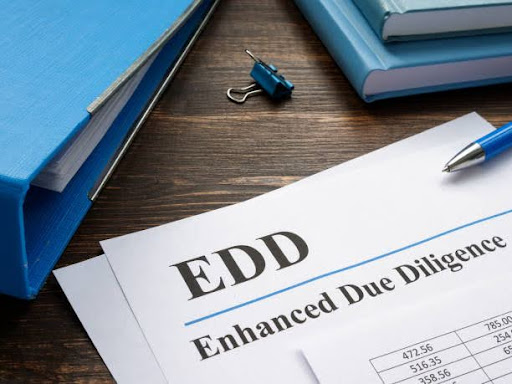As the legal requirements are becoming more dense, organizations need to use more proactive strategies in terms of compliance and risk. EDD has gained significance for organizations, which plan to avoid risks connected to financial crimes, like money laundering, fraud, and corruption. Artificial intelligence (AI) applications can profoundly improve EDD processes and the outcomes of these efforts. Specifically, this article establishes a review of AI in EDD and will discuss approaches to enhance EDDs’ compliance and manage risks.
What Is Enhanced Due Diligence?
Enhanced due diligence (EDD) is the real-time screening of the business partners to avoid and identify potential risks. One-time verifying business legal and financial status is not enough, as the company may be involved in financial crime at any stage of the financial dealing. Non-compliance with business national and international standards results in penalties. To avoid sanctions and hefty fines, it is crucial for businesses to be up-to-date about the financing of the partner companies.
The Role of AI in Enhanced Due Diligence
There are possibilities of utilizing AI technologies to enhance and optimize various procedures in EDD operations. Here are several key areas where AI can be effectively utilized:Here are several key areas where AI can be effectively utilized:
1. Data Aggregation and Analysis
It can also combine large volumes of data from different sources ranging from public records and social media, news articles, and more private databases. Several of them are dissected to reveal the patterns and anomalies which may point to risks from the cumulative data. For example:
Natural Language Processing (NLP): One can use NLP to analyze large amounts of text from documents as news articles, and social media, for negative references or any other activity concerning the subject.
Predictive Analytics: AI models can predict future behaviors and risks based on historical data, allowing for proactive risk management.
2. Identity Verification and Beneficial Ownership
The automation of identity documents also makes the processes faster and more accurate with the use of AI. It is also possible to use Machine learning algorithms to cross-check several fields to confirm identities while at the same time revealing concealed beneficial ownership structures. This is important for meeting the requirements of the laws including Fourth Money Laundering Directive (4AMLD) in EU and FinCEN regulations in USA.
3. Continuous Monitoring and Alerts
Consequently, AI-driven systems allow constant supervision of transactions as well as business partners, customers, and suppliers. Owing to the real-time data feeding, these systems can alert on such activities as and when they happen. Key techniques include:
Transaction Monitoring: AI models can be used to analyze the transactions’ patterns which can show that a specific transaction could be a case of money laundering fraud.
Behavioral Analytics: These analytics look at the activity of individuals and organizations over time, to look for the sort of behavior that is outside the norm which might be dangerous.
4. Risk Scoring and Prioritization
Needless to say, application of AI to EDD could be beneficial to organizations since it comes up with risk scores of potential partners and transactions. Machine learning models analyze multiple risk factors and provide an output that defines the degree of care to be provided. This enables the enterprises to channel their energies to the areas of highest risk.
Strategies for Implementing AI in EDD
To effectively integrate AI into EDD processes, organizations should consider the following strategies:
1. Invest in AI-Driven Tools and Platforms
Analyze types of AI-oriented programmes and platforms that are appropriate for corporate due diligence and compliance. Such tools must contain the principal data interfaces in integration, complex analysis, as well as simple and intuitive fronts. Dealing with reliable vendors would only guarantee that up-to-date technology and services are incorporated.
2. Build a Skilled Team
For any EDD business to reap the most from AI it is important that it has a competent team. This entails AI and analytics specialists who comprehend the business implications of the technology and legal requirements governing the implementation of AI solutions. It’s highly recommended to be trained and updated often since there are certain technologies and certain regulations that will always change.
3. Develop Comprehensive Data Governance Policies
AI implementation entails the need to work with high-quality data only. Data management policies should be put in place in organizations to enhance the accuracy, consistency, and security of the incoming data. This involves determining aspects such as data origin and acquisition, data handling and storage measures, and policies and procedures for data confidentiality and security.
4. Foster Collaboration Between Departments
Collaboration between compliance, IT, legal, and other relevant departments is vital for successful AI integration. This ensures that all stakeholders are aligned on goals, processes, and regulatory requirements. Regular communication and cross-functional teams can facilitate effective implementation and ongoing optimization.
5. Monitor and Evaluate AI Performance
Managing AI systems involves always monitoring and evaluating the performance of the systems to determine their effectiveness. This entails determining the probability of risk evaluation, the performance of data handling, and the efficacy of alerts. It is also important to conduct the audit often and update the models to ensure that they are still giving correct results.
Concluding Thoughts
Thus, AI-enabled enhanced Due Diligence is an unprecedented shift in the approach related to compliance and risks. Whereas, EDD is the process of continuing the assessment of a business within a specified period to lower the possibility of financial hitches and fight against fraudulence. It means that in developing business relations with partners, it is essential to pay attention to constant control, periodic assessment, and reporting on the state of security in the relations. Using general AI technologies will enable organizations to conduct better and faster due diligence, manage risks, and meet complicated regulatory frameworks. In the future, the usage of AI in EDD will be even more important due to changes in the environment where such a solution is operating since many organizations need to prevent issues such as financial crimes and negative impacts on the company’s reputation. In this case, organizations have to buy AI tools, develop competent staff, and collaborate across departments to manage the difficulties of enhanced due diligence in contemporary society.





Be First to Comment